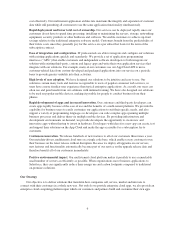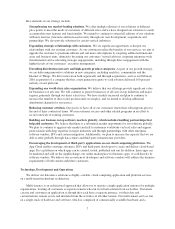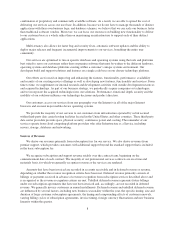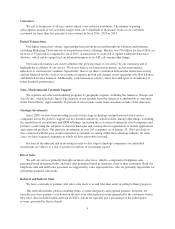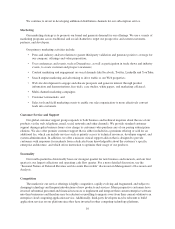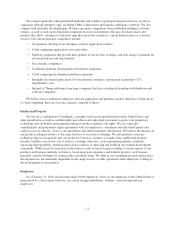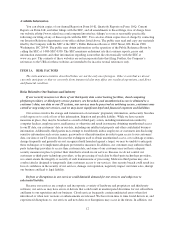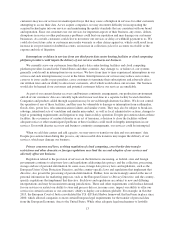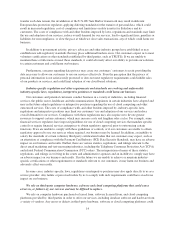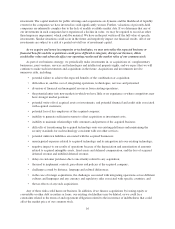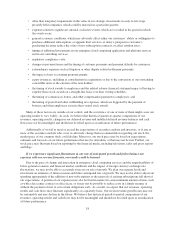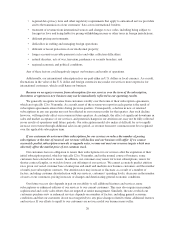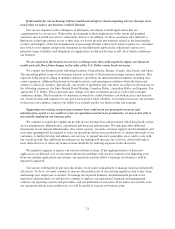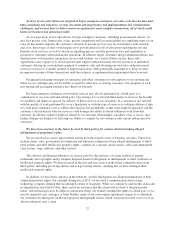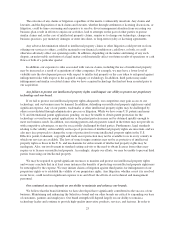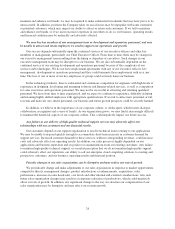Salesforce.com 2016 Annual Report Download - page 21
Download and view the complete annual report
Please find page 21 of the 2016 Salesforce.com annual report below. You can navigate through the pages in the report by either clicking on the pages listed below, or by using the keyword search tool below to find specific information within the annual report.transfer such data remain, the invalidation of the U.S.-EU Safe Harbor framework may result in different
European data protection regulators applying differing standards for the transfer of personal data, which could
result in increased regulation, cost of compliance and limitations on data transfer for Salesforce and its
customers. The costs of compliance with and other burdens imposed by laws, regulations and standards may limit
the use and adoption of our services, reduce overall demand for our services, lead to significant fines, penalties or
liabilities for noncompliance, or slow the pace at which we close sales transactions, any of which could harm our
business.
In addition to government activity, privacy advocacy and other industry groups have established or may
establish new self-regulatory standards that may place additional burdens on us. Our customers expect us to meet
voluntary certification or other standards established by third parties, such as TRUSTe. If we are unable to
maintain these certifications or meet these standards, it could adversely affect our ability to provide our solutions
to certain customers and could harm our business.
Furthermore, concerns regarding data privacy may cause our customers’ customers to resist providing the
data necessary to allow our customers to use our services effectively. Even the perception that the privacy of
personal information is not satisfactorily protected or does not meet regulatory requirements could inhibit sales
of our products or services, and could limit adoption of our cloud-based solutions.
Industry-specific regulation and other requirements and standards are evolving and unfavorable
industry-specific laws, regulations, interpretive positions or standards could harm our business.
Our customers and potential customers conduct business in a variety of industries, including financial
services, the public sector, healthcare and telecommunications. Regulators in certain industries have adopted and
may in the future adopt regulations or interpretive positions regarding the use of cloud computing and other
outsourced services. The costs of compliance with, and other burdens imposed by, industry-specific laws,
regulations and interpretive positions may limit our customers’ use and adoption of our services and reduce
overall demand for our services. Compliance with these regulations may also require us to devote greater
resources to support certain customers, which may increase costs and lengthen sales cycles. For example, some
financial services regulators have imposed guidelines for use of cloud computing services that mandate specific
controls or require financial services enterprises to obtain regulatory approval prior to outsourcing certain
functions. If we are unable to comply with these guidelines or controls, or if our customers are unable to obtain
regulatory approval to use our services where required, our business may be harmed. In addition, an inability to
satisfy the standards of certain voluntary third-party certification bodies that our customers may expect, such as
an attestation of compliance with the Payment Card Industry (PCI) Data Security Standards, may have an adverse
impact on our business and results. Further, there are various statutes, regulations, and rulings relevant to the
direct email marketing and text-messaging industries, including the Telephone Consumer Protection Act (TCPA)
and related Federal Communication Commission (FCC) orders. The interpretation of many of these statutes,
regulations, and rulings is evolving in the courts and administrative agencies and an inability to comply may have
an adverse impact on our business and results. If in the future we are unable to achieve or maintain industry-
specific certifications or other requirements or standards relevant to our customers, it may harm our business and
adversely affect our results.
In some cases, industry-specific laws, regulations or interpretive positions may also apply directly to us as a
service provider. Any failure or perceived failure by us to comply with such requirements could have an adverse
impact on our business.
We rely on third-party computer hardware, software and cloud computing platforms that could cause
errors in, or failures of, our services and may be difficult to replace.
We rely on computer hardware purchased or leased from, software licensed from, and cloud computing
platforms provided by, third parties in order to offer our services, including database software and hardware from
a variety of vendors. Any errors or defects in third-party hardware, software or cloud computing platforms could
14




